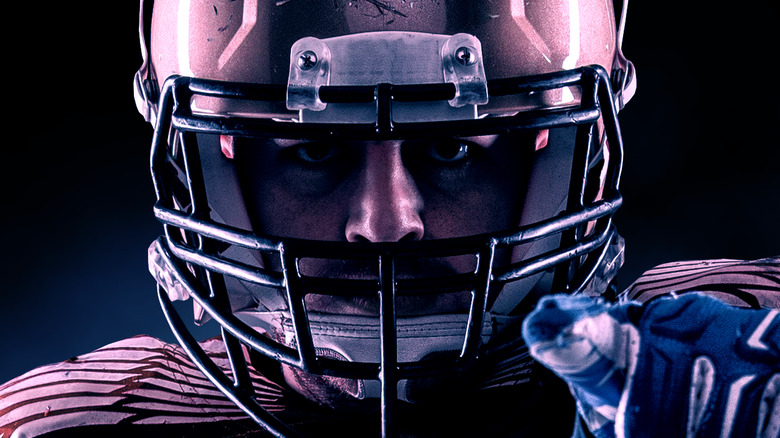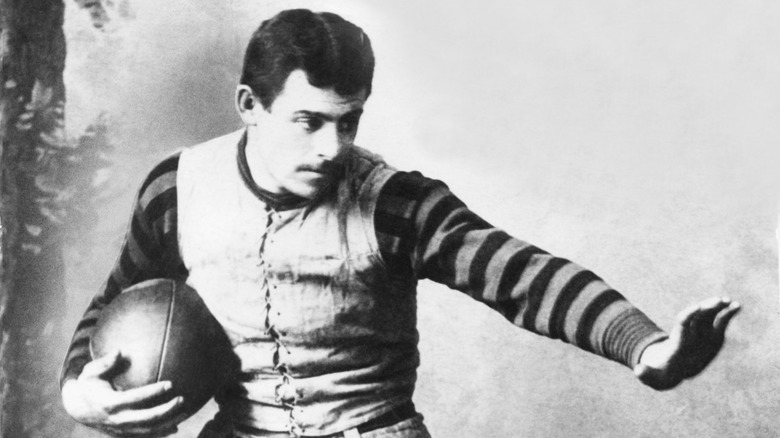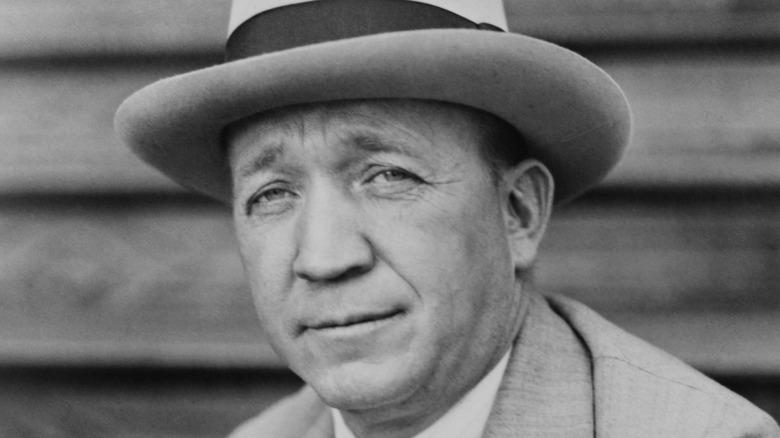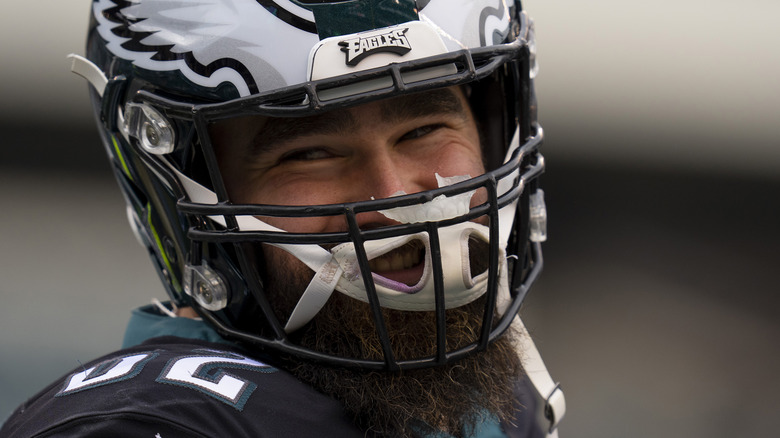The History Behind Saying Hut In Football
On any given Sunday or under Friday night lights in the fall, quarterbacks all over America line up under center or in shotgun formation, survey the defense, call their play, and yell "hut!" Most football fans accept "hut" as an integral part of the game, but few stop to think about where the word actually came from, and why quarterbacks say it. And as it turns out, even pro players take "hut" for granted, as former Washington Redskins (now Washington Commanders) QB Joe Theismann told The New York Times: "I started when I was 12 years old and I've been hutting my way through football for 55 years — but I have no clue why."
There are a few different theories about where hut in football really came from, and it may be impossible to know for sure. Some experts, though, think they've come close. What is for certain, the story of "hut" in football traces the development of the game millions now know and love, beginning in the earliest days of the sport, through post-World War II America, and beyond.
Quarterbacks used to stay silent
A conflation of rugby and soccer, the first American football game was played on November, 6 1869 between two colleges, Princeton and Rutgers, in New Brunswick, New Jersey, according to History. Time travelers watching that game would likely recognize a similar sport to what's played in the NFL today, but with some crucial differences. One of the biggest would be that the quarterback more often than not would stay silent, signaling plays with hand gestures rather than the string of nonsensical codewords followed by "hut," the sequence which football fans are now used to.
By the 1890s, legendary football player and coach John Heisman, after whom the Heisman trophy is named, became the first paid football coach in history at Oberlin College, as the official Oberlin website explains. Heisman (pictured) also coached at a number of other schools throughout his career. With a flair for the dramatic, Heisman — a part-time actor who played at Brown — encouraged his QBs to yell "hike!" as they broke the huddle, as Big Think reports. This, as well as an effort to prevent opposing teams from interfering with play calling, partially explains how and why quarterbacks began to speak and use audibles. Needless to say, "hike" is very different from "hut." To get at how and why "hike" may have evolved into "hut" takes us forward in time to the aftermath of World War II.
After World War II many former GIs played college football
After World War II, the G.I. Bill, officially called the Servicemen's Readjustment Act of 1944, helped many soldiers who served in the war go to college, as History explains. For this reason, many men who played college football in those days were also veterans. In turn, they adapted many aspects of the game to their military experience, discarding possibly "hip." That had been used since the '20s as a way to launch the "Notre Dame Shift," a play by another legendary college football coach, Knute Rockne (above). Also rejected was "hike," which had been used since the days of John Heisman (via Visual Thesaurus).
Instead of hike or hip, those World War II veterans playing the quarterback position chose another word with which they were familiar, also beginning with "h." Those former G.I. football players were used to responding to the shouted commands of their drill sergeants, who around that same time used "attention-hut," shortened to "tenhut," or sometimes just "hut" or "hup," as in "hut, two, three, four" when troops were marching, per Big Think.
Prior to World War II, America was still largely an agricultural economy, so many football players at the time not only had military experience, they were raised on a farm. It's part of this agricultural lifestyle where another common explanation for saying "hut" may be found.
Farmers say hut when herding their animals
Shouting "hut" was common, in fact, since long before the days of World War II veterans playing football in college, and even before the days of John Heisman and Knute Rockne. Since at least the 18th century, "hut" was a command on a different kind of field entirely. "Hut" was heard on farmland or pastureland grazed by all sorts of animals and tended by farmers and ranchers, as Visual Thesaurus explains. Just like a quarterback on the gridiron getting large men to move on his signal, "hup," "hip," and "hep" were also used to get farm animals to move when, how, and where the farmer's needed them to be, and it worked.
There's one other popular theory about where saying "hut" in football may have come from, per The Guardian. Although anecdotal, this version of the story references another well-known football player for Notre Dame, named Jeff Hudson, who played in the 1890s. In time, signaling Hudson was shortened to "hud" and finally "hut," and as those Notre Dame players went on to coach and play for other teams, they brought the word with them. Regardless of where the use of "hut" came from in football, it's better than most alternatives, according to NFL center Jason Kelce (above) from the Philadelphia Eagles. Via The New York Times, Kelce said, "I guess because it's better than yelling, 'Now,' or 'Go.' Some people have used 'Go' and that's awful. That doesn't sound like football."



